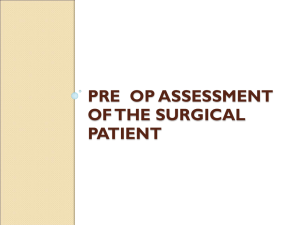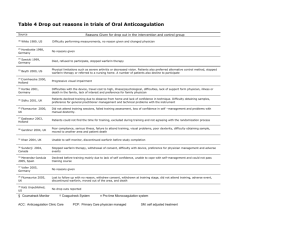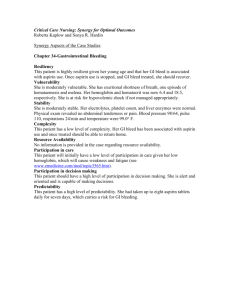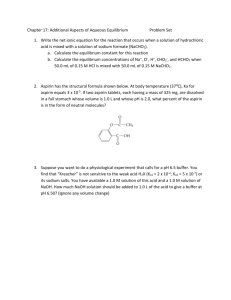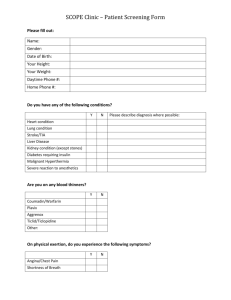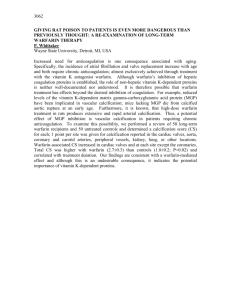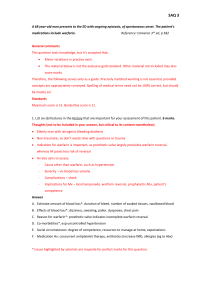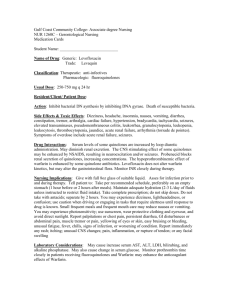Treatment injury case study
advertisement
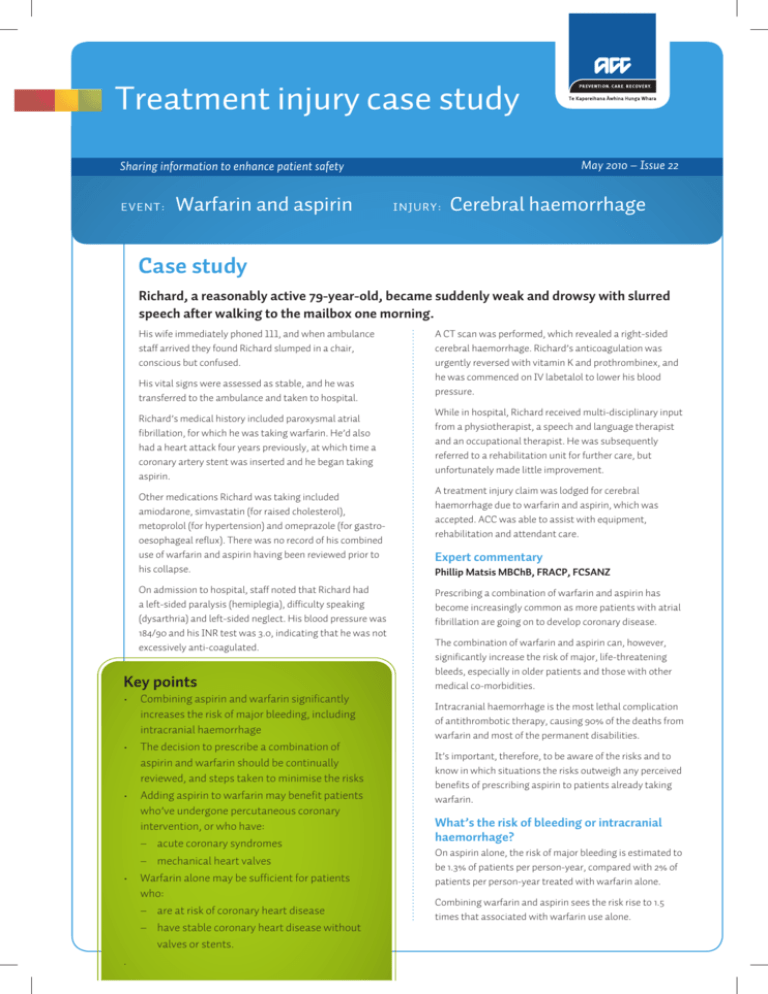
Treatment injury case study May 2010 – Issue 22 Sharing information to enhance patient safety Warfarin and aspirin EVENT: INJURY: Cerebral haemorrhage Case study Richard, a reasonably active 79-year-old, became suddenly weak and drowsy with slurred speech after walking to the mailbox one morning. His wife immediately phoned 111, and when ambulance staff arrived they found Richard slumped in a chair, conscious but confused. His vital signs were assessed as stable, and he was transferred to the ambulance and taken to hospital. Richard’s medical history included paroxysmal atrial fibrillation, for which he was taking warfarin. He’d also had a heart attack four years previously, at which time a coronary artery stent was inserted and he began taking aspirin. Other medications Richard was taking included amiodarone, simvastatin (for raised cholesterol), metoprolol (for hypertension) and omeprazole (for gastrooesophageal reflux). There was no record of his combined use of warfarin and aspirin having been reviewed prior to his collapse. On admission to hospital, staff noted that Richard had a left-sided paralysis (hemiplegia), difficulty speaking (dysarthria) and left-sided neglect. His blood pressure was 184/90 and his INR test was 3.0, indicating that he was not excessively anti-coagulated. Key points • Combining aspirin and warfarin significantly increases the risk of major bleeding, including intracranial haemorrhage • The decision to prescribe a combination of aspirin and warfarin should be continually reviewed, and steps taken to minimise the risks • Adding aspirin to warfarin may benefit patients who’ve undergone percutaneous coronary intervention, or who have: – acute coronary syndromes – mechanical heart valves • Warfarin alone may be sufficient for patients who: – are at risk of coronary heart disease – have stable coronary heart disease without valves or stents. . A CT scan was performed, which revealed a right-sided cerebral haemorrhage. Richard’s anticoagulation was urgently reversed with vitamin K and prothrombinex, and he was commenced on IV labetalol to lower his blood pressure. While in hospital, Richard received multi-disciplinary input from a physiotherapist, a speech and language therapist and an occupational therapist. He was subsequently referred to a rehabilitation unit for further care, but unfortunately made little improvement. A treatment injury claim was lodged for cerebral haemorrhage due to warfarin and aspirin, which was accepted. ACC was able to assist with equipment, rehabilitation and attendant care. Expert commentary Phillip Matsis MBChB, FRACP, FCSANZ Prescribing a combination of warfarin and aspirin has become increasingly common as more patients with atrial fibrillation are going on to develop coronary disease. The combination of warfarin and aspirin can, however, significantly increase the risk of major, life-threatening bleeds, especially in older patients and those with other medical co-morbidities. Intracranial haemorrhage is the most lethal complication of antithrombotic therapy, causing 90% of the deaths from warfarin and most of the permanent disabilities. It’s important, therefore, to be aware of the risks and to know in which situations the risks outweigh any perceived benefits of prescribing aspirin to patients already taking warfarin. What’s the risk of bleeding or intracranial haemorrhage? On aspirin alone, the risk of major bleeding is estimated to be 1.3% of patients per person-year, compared with 2% of patients per person-year treated with warfarin alone. Combining warfarin and aspirin sees the risk rise to 1.5 times that associated with warfarin use alone. Case study The risk of intracranial haemorrhage with aspirin alone is 0.3% of patients per person-year, and 0.5% of patients treated with warfarin alone per person-year. Combining the two drugs sees the risk rise two- to five-fold depending on the INR. When is combining aspirin and warfarin beneficial? Platelet inhibitors (including aspirin) form part of the medical management of acute coronary syndromes, and current guidelines recommend that aspirin be started in patients who are on therapeutic warfarin and have acute coronary syndromes. The combination of warfarin and aspirin has also been shown to decrease the frequency of thromboembolism in patients with mechanical heart valves, especially those who have: • • • • an embolus (while on warfarin therapy) a history of cerebrovascular or peripheral vascular disease a hypercoagulable state coronary disease. Risk associated with percutaneous coronary intervention (PCI) Stent thrombosis results in significant patient morbidity and mortality. Triple therapy (warfarin and dual antiplatelets) is superior to a combination of warfarin and aspirin for stent thrombosis. Compared with those on triple therapy, patients taking warfarin and aspirin who are undergoing PCI are seven times more likely to suffer stent thrombosis, but three to five times less likely to suffer major bleeding. In addition, the stroke rate is four-fold higher for patients taking dual antiplatelets alone compared with the triple therapy group. It’s important to consider carefully the type of stent used – bare metal stents allow the necessary duration of triple therapy to be limited. Limiting triple therapy to one month halves the risk of bleeding compared with prolonged use (six months or longer). When is aspirin not necessary? In patients at risk of coronary artery disease, warfarin therapy alone has been shown to be effective in its primary prevention. The possible benefit of adding aspirin for this purpose is outweighed by the increased risk of major bleeding. In fact, if patients are already on warfarin for atrial fibrillation, there’s no benefit in adding aspirin. How ACC can help your patients following treatment injury Many patients may not require assistance following their treatment injury. However, for those who need help and have an accepted ACC claim, a range of assistance is available, depending on the specific nature of the injury and the person’s circumstances. Help may include things like: • • • contributions towards treatment costs weekly compensation for lost income (if there’s an inability to work because of the injury) help at home, with things like housekeeping and childcare. No help can be given until a claim is accepted, so it’s important to lodge a claim for a treatment injury as soon as possible after the incident. This will ensure ACC is able to investigate, make a decision and, if covered, help your patient with their recovery. ACC5406 Printed May 2010 ©ACC 2010 Warfarin alone has also been found to be effective in the secondary prevention of coronary artery disease in stable patients (ie, those with no ischaemia or PCI in the previous six months). The addition of an antiplatelet agent is not required unless the patient has a coronary stent, a mechanical valve or an excessive thrombotic risk. Summary While the literature on this topic is limited, it suggests that the decision to prescribe aspirin to patients already on warfarin should be individualised and continually reviewed, especially with aging patients. The risks can be minimised by: • • • • controlling INR tightly (2.0 to 2.5) using the lowest dose of aspirin keeping blood pressure optimally controlled (<140/90) advising the patient to avoid alcohol. References Fang MC, Chang Y, Hylek EM et al. Advanced age, anticoagulation intensity, and risk for intracranial hemorrhage among patients taking warfarin for atrial fibrillation. Ann Intern Med 2004; 141:745 Hart RG, Benavente O, Pearce LA. Increased risk of intracranial hemorrhage when aspirin is combined with warfarin: a meta-analysis and hypothesis. Cerebrovasc Dis 1999; 9:215 He J, Whelton PK, Vu B, Klag MJ. Aspirin and risk of hemorrhagic stroke. A metaanalysis of randomized controlled trials. JAMA 1998; 280:1930 Holmes DR, Kereiakes DJ et al. Combining antiplatelet and anticoagulant therapies. Journal of the American College of Cardiology 2009; 54(2):95-109 Karjalainen PP, Porela P, Ylitalo A et al. Safety and efficacy of combined antiplateletwarfarin therapy after coronary stenting. Eur Heart J 2007; 28:726-732 New Zealand Cardiovascular Guidelines Handbook – 2009 Edition. Accessed from http://www.nzgg.org.nz/guidelines/0154/CVD_handbook_june_2009_update.pdf Nishimura RA, Carabello BA, Faxon DP et al. ACC/AHA 2008 guideline update on valvular heart disease: focused update on infective endocarditis. J Am Coll Cardiol 2008; 52;e1-e142 Madhwal S, Lincoff AM, Rolston DK. Should patients on long-term warfarin take aspirin for heart-disease? Cleve Clin J Med 2008; 75(3):206-208 PROGRESS Collaborative Group. Randomised trial of a perindopril-based bloodpressure-lowering regimen among 6,105 individuals with previous stroke or transient ischaemic attack. Lancet 2001; 358:1033 Rosand J, Eckman MH, Knudsen KA et al. The effect of warfarin and the intensity of anticoagulation on outcome of intracerebral hemorrhage. Arch Intern Med 2004; 164:880 Claim information Between July 2005 and December 2009, ACC received 96 treatment injury claims related to aspirin, warfarin or a combination of the two. Of these, 66 claims were accepted (69%). Approximately nine accepted claims involved intracranial haemorrhage linked to a combination of aspirin and warfarin. The most common injury amongst the accepted claims was cerebrovascular accident or cerebral haemorrhage (31 accepted claims) followed by haematomas (11) and other forms of haemorrhage and bleeding (6). The most common reasons for declining a claim related to treatment with warfarin or aspirin were that no physical injury could be identified, that the injury was not caused by treatment, and that the injury was considered to be an ordinary consequence in the circumstances. About this case study This case study is based on information amalgamated from a number of claims. The name given to the patient is therefore not a real one. The case studies are produced by ACC’s Treatment Injury Centre, to provide health professionals with: • • an overview of the factors leading to treatment injury expert commentary on how similar injuries might be avoided in the future. Send your feedback: AdminTeamTI&PS@acc.co.nz
